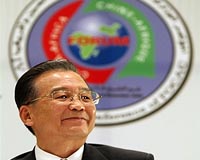| . |  |
. |
Beijing (AFP) March 14, 2011 Premier Wen Jiabao said Monday China must seek political reform but neither gave proposals nor a timetable for expanding its limited village-level elections, saying it would be a "gradual progress." "Without political reform, economic reform cannot succeed and the achievements we have made may be lost," Wen told a press conference, repeating comments made last year that prompted rumours of a top-level split over reform. However, speaking after the close of the country's annual parliament session, Wen made clear that any transition to electoral politics would be made only under the "leadership of the (Communist) party." "We must pursue a step-by-step approach in this process. We must believe that when the people are capable of running village affairs well, they will also be capable of ... running a township and a county," he said. "That will be a gradual process." Wen made similar comments promoting political reform last August during a visit to the southern city of Shenzhen and in a subsequent interview with CNN. The remarks sparked speculation of a divide between him and President Hu Jintao, who later made more tepid comments on reform. However, political analysts have subsequently said Wen had actually intimated nothing significant in August, instead paying the usual lip service to reform and democracy favoured by the Communist Party. The ruling communists maintain an iron grip on political power and go to great lengths to crush challenges to their rule. China allows direct elections for village leaders across the country but the process is tightly controlled by local Communist Party leaders. China's parliamentary chief Wu Bangguo, who is officially number two in the country's hierarchy, outranking Wen, last week ruled out any shift to multi-party democracy. In a speech to the National People's Congress, Wu said abandoning the current Communist Party-dominated system could cause the country to "fall into the abyss of civil strife."
earlier related report Guo Weidong, 38, was charged with "inciting subversion" Friday after he posted Internet calls for protesters to attend rallies marking the "Jasmine revolution," the Information Centre for Human Rights and Democracy in China said. Guo, a businessman in east China's Zhejiang province, was taken into police custody Thursday, the Hong Kong-based centre said in a statement. Chinese authorities have launched a security clampdown in major cities in response to calls for protests inspired by the "Jasmine revolution" in Tunisia, which sparked a wave of unrest against authoritarian regimes in the Arab world. Police have been deployed in force on the last three Sundays in both Beijing and Shanghai to prevent any demonstrations and block foreign media coverage of them. No public protests have been seen, although foreign journalists were beaten at a designated rally site in Beijing two weeks ago by thugs believed to be linked to police. As in previous weeks, posts on overseas Chinese websites and micro-blogs again urged disgruntled Chinese to "stroll and smile" in designated sites in 34 cities on Sunday, but to "take no action and avoid confrontation" with police. According to the Chinese Human Rights Defenders (CHRD), also based in Hong Kong, Guo was the 18th activist to be arrested and charged for alleged links to inciting the protest. At least three other activists have been charged over the past few days. Up to 100 activists around China have been placed under house arrest, interrogated or taken into police custody without charge for their alleged links to the rallies, CHRD said earlier. On Sunday, at Beijing's Wangfujing commercial district -- a designated rally site -- there was no massive police presence as seen on previous Sundays. Security in Beijing, however, has been tight since the annual 10-day meeting of parliament started in early March when state press announced that some 180,000 police and 560,000 security volunteers began patrols in the capital. In Shanghai, no major unrest was seen, but police were seen checking identification papers and urging journalists to depart from the designated rally site on People's Square. Wary of the potential for social unrest across China, Premier Wen Jiabao pledged last month to tackle a range of hot-button public concerns including soaring inflation, runaway economic growth, and official corruption. China's leaders have watched with worry as those and other issues touched off political convulsions in the Middle East and North Africa.
Share This Article With Planet Earth
Related Links Democracy in the 21st century at TerraDaily.com
 'No analogy' between China and Mideast unrest: Wen
'No analogy' between China and Mideast unrest: WenBeijing (AFP) March 14, 2011 China's Premier Wen Jiabao rejected any comparison Monday between his country and the unrest-hit Middle East, but said Beijing faced a tough test dealing with inflation and other hot-button issues. "We face extremely daunting tasks and complex domestic and international situations," Wen told reporters in an annual press briefing after the close of the nation's parliament session. China's ... read more |
|
| The content herein, unless otherwise known to be public domain, are Copyright 1995-2010 - SpaceDaily. AFP and UPI Wire Stories are copyright Agence France-Presse and United Press International. ESA Portal Reports are copyright European Space Agency. All NASA sourced material is public domain. Additional copyrights may apply in whole or part to other bona fide parties. Advertising does not imply endorsement,agreement or approval of any opinions, statements or information provided by SpaceDaily on any Web page published or hosted by SpaceDaily. Privacy Statement |